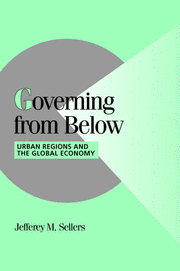1 - PLACES IN THE GLOBAL ECONOMY
Published online by Cambridge University Press: 14 January 2010
Summary
Across the advanced industrial world and beyond, a far-reaching transformation is under way. For decades now, the five-hundred-year-old system of political authority that emerged with the system of European states has been giving way to a new order. Even as policy makers, the media and much of political science remain transfixed by Washington, Paris, London and Bonn, or Brussels or Frankfurt, more and more of the politics that matters most for the lives of citizens is shifting elsewhere. To secure some of the most important goals of advanced industrial society, presidents, prime ministers and elite bureaucrats look increasingly to regional economies, to private markets, to urban partnerships, to citizen activism. Efforts to promote prosperity, to protect the environment and to further equity for the disadvantaged increasingly rely on activities at the regional and local levels. This new reality requires a new realization of the role that localities and regions play in wider political economies and renewed attention to the metropolitan areas where people live. In these places lie principal sources not only of environmental and social successes but also of economic rigidities in Germany; of the mixed successes of recent policy making in France; and of persistent inequities, as well as recurrent dynamism, in policy making in the United States. In developed countries, and more starkly in the developing world, efforts to govern urban regions confront parallel dilemmas between prosperity, equity and the quality of life.
To account for a global transformation of this order requires a search for equally far-reaching causes.
- Type
- Chapter
- Information
- Governing from BelowUrban Regions and the Global Economy, pp. 1 - 36Publisher: Cambridge University PressPrint publication year: 2002

